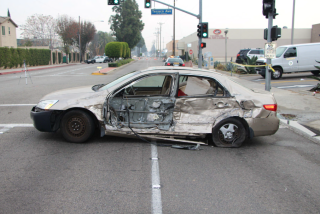Settlement Urged in Fatal Car Accident
- Share via
Because a top prosecutor was using his county-issued car when he rear-ended another vehicle and killed its driver, the county Claims Board on Wednesday recommended paying the victim’s son more than $190,000 to settle a wrongful death lawsuit.
Wayne Doss, who heads the district attorney’s child support collections operation, was driving home on June 27, 1996, when he crashed into the car in front of him, killing 69-year-old Gene Berry, according to documents filed with the Claims Board.
Investigators concluded that Doss was talking on his cellular telephone and following Berry’s car too closely when the accident occurred.
Police reports say there were no skid marks at the scene, indicating that Doss did not brake before hitting Berry’s car, according to the deputy state attorney general who prosecuted Doss in a related criminal case. Doss pleaded no contest to a charge of misdemeanor vehicle manslaughter earlier this month and is scheduled to be sentenced May 21.
There was some question of whether Berry had stopped or slowed his car on the transition road between the Long Beach and San Bernardino freeways. But California Highway Patrol investigators concluded that Doss was driving at an unsafe speed for the road conditions, and that he was inattentive.
Berry suffered extensive injuries and was taken to County-USC Medical Center, where he was pronounced dead from blunt force trauma. Doss was knocked unconscious by the force of the impact and the deployment of his car’s air bag, but he later tried to help resuscitate Berry with the aid of a passing motorist.
After evaluating the circumstances, lawyers defending the county in a civil lawsuit brought by Berry’s son recommended settling out of court rather than having the case heard before a jury that could award far higher damages.
“We believe a court or jury would find that the deputy district attorney was negligent for failing to observe the slowly moving vehicle in front of his car in time to take evasive action,” Assistant County Counsel S. Robert Ambrose concluded in recommending the settlement.
County officials also disclosed that they are reviewing the matter to see if Doss violated any county policies regarding the use of county cars. Doss has not been disciplined pending the outcome of that inquiry.
Lawyers for the county said Doss is not alone in getting into trouble in a county car.
Over the past two years, in fact, about 1,200 county employees were in accidents that cost the county more than $9.6 million. Some were driving county cars while others were driving their own in the course of county business, said Principal Deputy County Counsel Phil Miller, supervisor of auto and general liability claims.
“In terms of severity, there aren’t many like this,” Miller said. “The vast majority are property damage; very few involve injuries of this magnitude.”
After the CHP investigated the accident, it recommended that Doss be charged with vehicular manslaughter without gross negligence. He entered a no-contest plea to the misdemeanor charge shortly before his case was scheduled to go to trial.
His attorney in the criminal case, Gerald L. Chaleff, said he expects Doss will get “some probation, community service and a fine.” He contended that Doss did nothing that could be construed as a criminal violation, “but Mr. Doss obviously felt badly about what happened, and he wanted to put this behind him.”
Chaleff said Doss was the victim of a state legal code that makes almost any traffic violation a criminal offense if an accident and injury occur as a result.
“It is a tragedy when anybody dies in any accident. But the question really is, should it be punished as a crime or handled as a civil wrongful death?” Chaleff asked. “In this case, they did both. . . . We’ve elevated bad driving to manslaughter.”
State Deputy Atty. Gen. Bob Snider--whose office prosecuted Doss because the district attorney’s office would have had a conflict of interest--said the criminal charges were filed “because the collision was caused by the driver’s carelessness.”
The county Board of Supervisors still must approve the payment of the claim.
More to Read
Sign up for Essential California
The most important California stories and recommendations in your inbox every morning.
You may occasionally receive promotional content from the Los Angeles Times.













